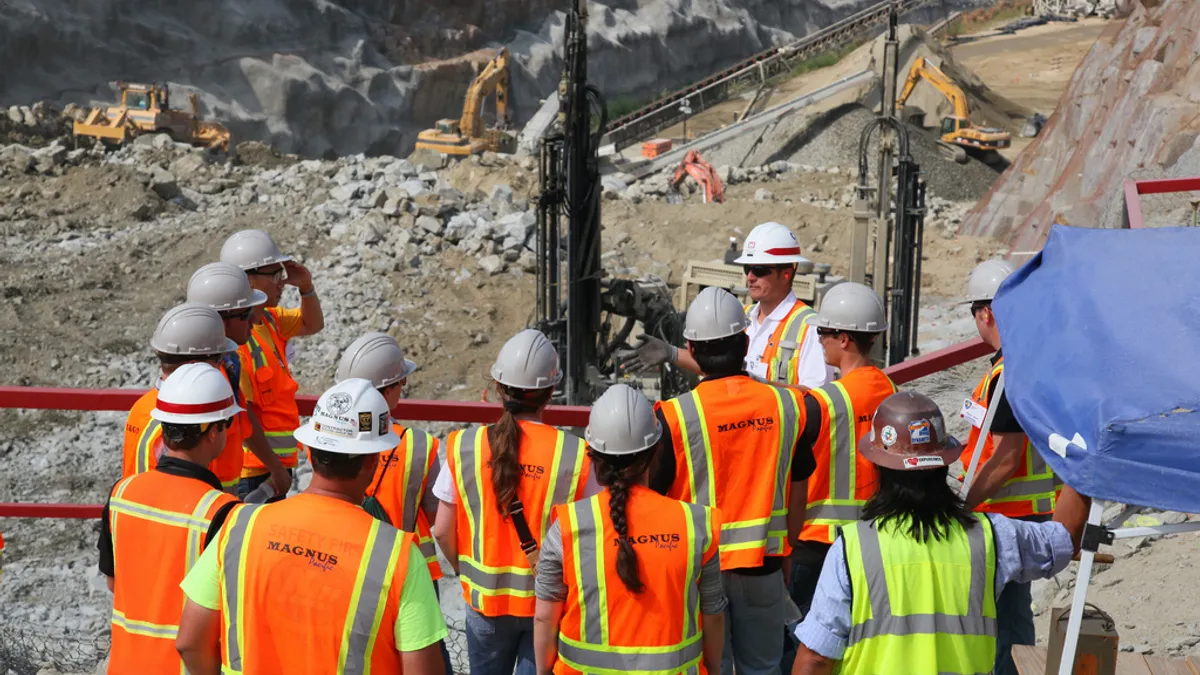The talent shortage — and its ramifications — are nothing new for the construction industry. Companies continue to struggle to fill positions at all levels, from the trades to management. And, unfortunately, the industry isn't hopeful that the situation will improve anytime soon.
Workforce management was a key theme of the first day of the Associated General Contractors of America Annual Convention, held this year in Las Vegas. However, panelists at the event went beyond the typical rehashing of the dire nature of the current employment situation to offer a new take on potential solutions.
One of those solutions that doesn't get a lot of play currently: company culture. When firms battle for top talent, their identity and purpose are crucial factors that can retain employees. In addition to improving culture, companies can also increase their focus on schools and encourage the next generation of workers to choose a career in construction.
DeWayne Ables, founder and president of Pioneer IQ, in Olathe, KS, said during one talent-development panel that there should be "people flocking into this industry, but it’s not happening because we aren’t communicating our impact."
Panelists offered the following four tactics to win the fierce construction talent war:
1. Recognize the current industry climate
It starts with self-awareness. During the recession, nearly 25% of construction employees fled the industry. Now, business has bounced back strong, with many companies unable to keep up with booming demand.
As a result, "recruiting has moved from passive to aggressive," Ables said. "Our industry has been forced to change."
He noted that companies are likely to have a list of the top 25 people from other firms they have their eye on to potentially recruit. "The likelihood is that your good people are on someone else's list," Ables said.
Sometimes, a competitor will wait until one company has trained their workers before swooping in and stealing them for their own team. "The war is going to get a lot more intense," he said.
As a result, construction companies need to ensure they are the best place for top talent to work.
2. Define your company's purpose
Construction, of course, is a business, and as such it is dominated by schedules and profits. However, if corporate leadership acts as if money is their only driver, employee loyalty could suffer. A better approach is to focus on the reason a firm is building a project, according to Ables. Once a company clearly defines that purpose, it must communicate it effectively internally before promoting it externally.
Construction is unique in its ability to change and improve a community. From hospitals to schools to parks, builders have the power to add new structures and spaces that can have a major impact on the people who use them.
"People want to have significance. Show me an industry that can have more significance on our society than ours," he said. "We need leaders around us who can really motivate us and remind us why all this is worth it."
When a firm emphasizes its purpose over profits, it can hold onto those employees who might be offered a better salary elsewhere, but who value the opportunity to make a difference in their current company.
3. Choose the right employees and clients
In an inherently relationship-driven business, companies must know with whom they can effectively work — and with whom they can't. With a clearly defined purpose, they can choose the owners and clients that are a good fit and "appreciate their expertise and impact," Ables said. "You have to develop a vision that’s worth fighting for."
Leaders must be willing to reject new projects or clients, even if that means missing out on potential profits. "The more we can eliminate what we aren’t, the more we can do what we love," Ables said.
Along with selecting the right clients, companies also need to ensure they are hiring the right employees. They should clearly define their ideal employee in terms of personality, passion, skill and experience — and then stick to those goals.
Once the company hires new employees, it also should show them where their career path can go. A sense of purpose combined with a clear career trajectory can be a powerful motivator.
4. Partner with schools to develop young talent
Despite the positive outcomes that can result from improving company culture and purpose, the future is still bleak unless a new wave of workers enters the construction industry. Participants in a separate talent development panel encouraged companies to partner with local schools to help with career technical education programs.
In a time when schools tend to push college as the only option for students, industry leaders must demonstrate the viable and fruitful careers that are available in construction. "Give the industry a voice at this level," said Ralph Mora, the apprenticeship and National Center for Construction Education and Research training director at AGC New Mexico. "Those kids are going to be the future of the construction industry."
In addition to working with schools and technical programs, employers must also commit to training young workers and developing them into skilled employees, according to Mandy Beaulieu, training director of the Construction Education Foundation in Alaska. "They want to work, but the industry needs to be willing to continue working with them to get them where they need to be to be profitable for your company," she said.




















